Some of the most common questions Focus readers ask are about COVID-19 and long-term smell loss. We asked an expert to weigh in on the latest science around this symptom.
Throughout the pandemic, smell loss, or anosmia, has been both an early sign of a COVID-19 infection and one of its most persistent long-term symptoms. Parosmia, or distortions in smell that cause scents to smell wildly different, has also made headlines as another symptom of an infection.
Focus asked anosmia expert Eric H. Holbrook, MD, director of Rhinology at Mass Eye and Ear, to update readers on the latest information on COVID-19 and smell.
What is unique about COVID-19 and smell loss?
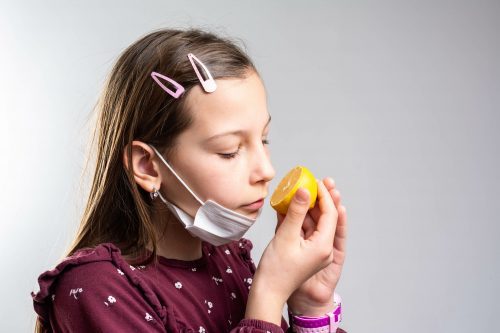
It’s first important to note that, before the pandemic, we would see patients with smell loss after viral infections, such as colds or other illnesses. Now, the majority of patients I see have smell loss after COVID-19. What is especially unique is that COVID-19-related smell loss is affecting a much younger age group. Smell loss after a viral infection had been very rare in the pediatric population, but now physicians are seeing many young children develop the condition. The youngest patient I’ve seen so far is nine years old. We’re anticipating these numbers increasing as the pediatric age group is still without a vaccine and therefore more prone to COVID-19 infection.
Regardless of age, recovery from persistent smell loss after COVID-19 follows a similar pattern as other post-viral smell losses.
What is the typical course of smell loss after COVID-19?
These patients often fall into two groups: One that recovers within a few weeks, and a second group that has prolonged smell loss. The latter varies in the degree of smell loss, how quickly smell returns and other associated symptoms, such as parosmia.
Loss of smell can present differently depending on the initial infection and its severity. Some patients have a complete smell loss while others have already experienced some recovery by the time I see them, even if they had complete loss at one point. Some patients don’t have as severe smell loss in the beginning, but it diminishes later on. People with partial sense of smell can detect certain things but not others. I’ve had some patients tell me they have normal smell for most things, but can’t smell their baby’s dirty diaper, for example.
What have doctors seen with parosmia?
Parosmia seems to occur more frequently now with the high frequency of COVID-19 infected patients compared to other viruses. The condition occurs when a scent is altered and doesn’t smell the way it used to. People with parosmia almost always describe abnormal and unfortunate smells. Since smell and taste are so intertwined, a person may find his or her flavor of food is also unpleasant.
A virus is not the only cause; people with head injuries have also experienced parosmia. One theory of why that happens begins with the regeneration of nerves in the nasal cavity following a viral infection or other damage. When the new nerves in the lining of the nasal cavity have to target back to the brain and these nerves aren’t targeting the same areas that they previously made contact with, the connections result in mixed wiring and mismatched smells.
Have scientists learned more about how COVID-19 causes smell loss?
There remains much to learn, but several papers have shed some light on potential mechanisms. These articles found that the virus causes inflammation within the epithelium – the nasal lining – surrounding nerves, but it doesn’t necessarily invade the nerves. This inflammation may alter the cellular programming of the olfactory neurons, the special nerves that detect odors throughout the air and turn them into electrical signals sent to the brain resulting in smell. It’s almost as if the virus is hijacking these cells’ programming so that they aren’t making the proper proteins required for transmitting that odor into an electric signal.
Are there any new noteworthy studies looking at smell loss and COVID-19?
One interesting line of research is looking at the “long haulers” who still have symptoms of COVID-19 longer than most people who recover. A recent review paper I co-authored theorizes that there might be a correlation between people who have long-term neurologic symptoms and those who had experienced long-lasting loss of smell. That research remains ongoing and does not imply causation; therefore, there is no reason to alarm patients that they might also develop neurologic symptoms.
How has the knowledge of treatments evolved over the pandemic?
Unfortunately, not very much. Some interventions physicians are reportedly trying are not proven and lack evidence of effectiveness.
I typically prescribe smell training, which involves smelling essential oils of certain scents in an effort to retrain the brain to detect them. I tend to be conservative about trying experimental treatments or oral medications in the hopes something unproven might work. In some cases, such as with oral steroids, treatments might be counterproductive and reduce the immune systems’ ability to fight off the virus. We just don’t know if there’s any benefit to prescribing such treatments during an active COVID-19 infection.
If somebody has underlying nasal symptoms like congestion, allergies and sinus problems, those issues can be treated to reduce additional inflammation in the nose. Unrelated causes of inflammation, such as allergies, can contribute to additional diminished sense of smell.
There are many tips and home remedies on social media. What advice do you have for patients seeing these stories?
Information you read online or on social media should not take the place of seeking medical care and assuring there are no other causes. If you’re taking advice from Facebook or TikTok, you’re not confirming whether COVID-19 is the root cause of your smell loss. Many of the therapies that are discussed on social media have no scientific basis, and some can be downright dangerous. That’s why it is important to see a medical specialist.
Is there hope for people with loss or distorted sense of smell after COVID-19?
What’s encouraging for patients is that, unlike hearing and vision, our smell system can regenerate and repair the damaged nerves that detect odors. Regeneration can take quite a long time, however – over a year in many cases. The return of smell is so gradual that it’s very difficult to notice the change on a day-to-day or week-to-week basis. Patience is very important when it comes to recovery from smell loss.
Read more commentary from Dr. Holbrook in Verywell and ENT Today.
About Our Expert
Eric Holbrook, MD, is director of Rhinology at Mass Eye and Ear and a co-founder of the Sinus Center. He sees patients at 243 Charles Street in Boston.
is director of Rhinology at Mass Eye and Ear and a co-founder of the Sinus Center. He sees patients at 243 Charles Street in Boston.
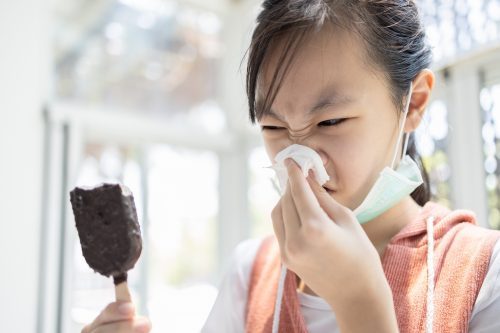
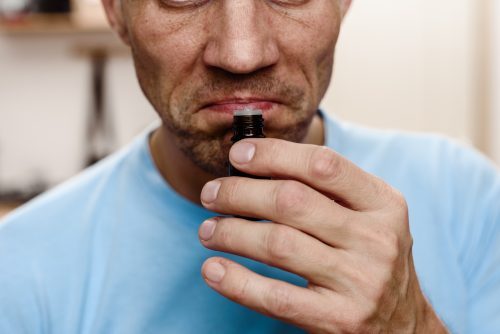
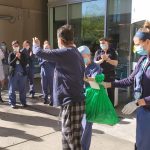

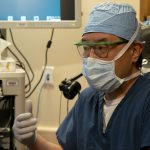
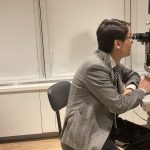
Good info. I been affected by this loss of smell and it’s been challenging for sure. My taste has been better then my smell. It’s been 10 months since recovering from mild covid-19. and my sense of smell has been close to zero at times. If i do smell certain things it’s sometimes distorted like Gasoline or peanut butter, cologne. I really miss smelling things.
Thanks for reading and your comment Rodney, we’re so sorry to hear your smell has been affected following COVID-19. We hear similar stories from many patients.
What caught my eye is that seasonal allergies may affect sense of smell because of inflammation. I had covid 10 months ago (like another poster) and can smell most things, but there is a group of foods I cannot consume because the smell and taste is so bad. I’m hoping that I’m in the group that regenerates in a year…I miss what garlic and onions, wine, peanut butter, bell peppers used to taste like.
Thanks for reading and your comment, Stella, we’re pulling for you that you regain some of what you have lost.
Thank you for this. I have experiencing an unusual smell with some detergents and soaps lately. I had a fairly mild case of Covid 6 months ago. I had back issues also so maybe that’s why I didn’t notice right away. Salt also bothered me. It seemed very strong in some foods and I couldn’t enjoy them! If I smell an item closely I smell what I remember them as smelling. But I told my husband it’s as if it is in the lining of my nose! I use to be able to smell everything strongly! But thanks to you now I know what it is! Hopefully it will not last. I am 75 years old and fairly healthy. All my numbers are good, and lungs and heart are good. Thank you.
I am at 17 months post covid and still have very little taste or smell. It has improved slightly, maybe to 10% of some things and I can smell the essential oils. Nothing I eat tastes like it should. I went through a spell of burnt rubber shortly after recovering from covid in July 2020. Should I begin accepting that this may be permanent? There seems to be very little, if any treatment. I do have allergies and live in the Phoenix Arizona area. Can this be permanent? Should I hold out hope after nearly 1.5 years?
Thank you,
Hi Kristi, thanks for reading and your comment and we are sorry for what you’re going through. We can’t comment on specific cases on our blog and encourage you to check with a specialist, but doctors and researchers still have much to learn about COVID-related smell loss and its long-term consequences.
How do I get rid of the horrible smell and taste after covid? I cannot eat anything. I had covid two years ago in october. PLEASE help.